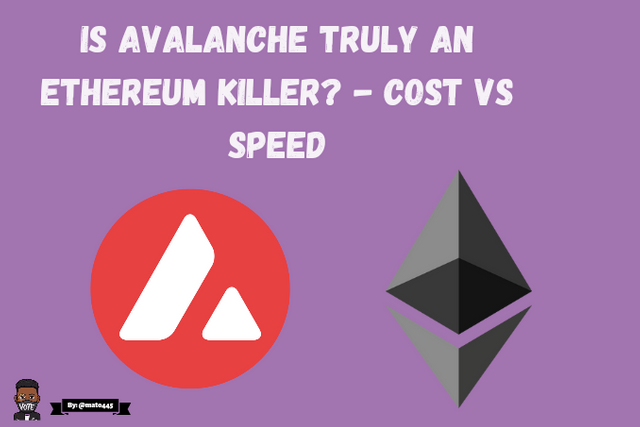Is Avalanche Truly An Ethereum Killer? - The Fee/Cost Vs Speed
One of the biggest blockchains in the world is Ethereum, which ranks alongside Bitcoin. It is currently thought to be the biggest blockchain that is devoted to smart contracts. Numerous projects have already been developed on Ethereum, and more will do so in the future.

The Ethereum blockchain has many features, but it is far from flawless. The Ethereum blockchain actually has a significant issue: slower transaction speeds relative to the competitors, greater transaction costs relative to the competitors, and unsustainable before switching to a Proof-of-State mechanism.
The majority of developers that examined the Ethereum blockchain closely and found its problems decided to create a better version of Ethereum with faster and less expensive transaction fees to challenge Ethereum. Due to their competition with Ethereum, these projects are now referred to as "Ethereum Killers."
There are several Ethereum competitors in the market right now, but let's focus on The Avalanche Blockchain as an example.
Is Avalanche More Effective Than Ethereum?
The phrase "Ethereum killer" may have been accurate at the beginning of the cryptocurrency revolution and progress, but Ethereum as a blockchain has been expanding steadily thanks to the enormous number of developers that most blockchains, including Ethereum, have. Does Avalanche continue to dominate, though?
Avalanche was able to process a remarkable 4,500 transactions per second, which is a staggering 17,900% more transactions than the Ethereum blockchain could manage before date (15–25 transactions per second on average), which is a huge improvement. However, as a result of the Ethereum merger and its switch from the Proof-of-Work to the Proof-of-Stake consensus method, Ethereum is currently outpacing its competitors with a 2,100%+ increase in transaction bandwidth and the ability to complete up to 100,000 transactions per second.
How does it look in terms of value? The Ethereum blockchain is well recognized for levying an additional fee known as the "gas fee" in addition to the standard transaction fees (often demanded by exchanges). The Avalanche blockchain does not apply to this because there is no gas fee. Has anything changed with the merger and the switch to Proof-of-Stake? It's amusing that the response is no (though seems to have reduced some fees but not to a very significant amount).
Even when no gas is used, the Ethereum blockchain continues to retain the gas fee. The claim is that stakers will receive the gas costs for lending their Ether (ETH) to the blockchain.. Avalanche still wins in this scenario since the merger and the switch to PoS had little or no impact on the expenses associated with transactions on the Ethereum network.
Conclusion
If there were a blockchain competition, it would essentially be a draw, but users who choose the Avalanche blockchain win (assuming they have everything a user needs), as most people might not notice the Avalanche blockchain's sluggishness in comparison to Ethereum's new speed, but we will all undoubtedly notice the inflammation of gas fees in our wallets.